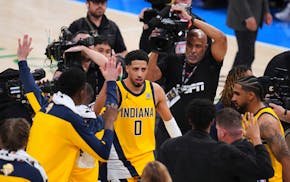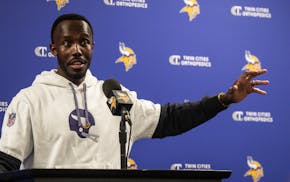Alasan Ann rolled up his shorts to show a scar on the inside of his right thigh. This he calls his "golden leg," the leg the Olympic taekwondo athlete from Maple Grove leads with in his fights. A lot of people have been hurt by this leg. "When I hit them," he said, "they really feel it."
The scar on Ann's golden leg was the size of a bullet hole. It is the lone physical reminder of the moment last fall when he wondered if his career, perhaps his life, was over.
"It felt like a hot knife, just drilling inside of you," the 23-year-old graduate of Maple Grove High School said. "In my head, I thought, 'Well, that's the end of the career right here.'"
No matter what happens in Paris, where Ann will fight as a heavyweight on Saturday in the Summer Games, he is a massive success story. He is an Olympian, achieving the dream he's been chasing since he first touched an Olympic medal at age 12. He is competing for the Gambia, the tiny coastal West African country of 2.5 million people that his dad hails from.
He is the first Olympic martial arts athlete from the Gambia, a country that's never medaled in the Olympics. Earlier this year, he opened a branch of World Taekwondo Academy in Andover, where he already has 35 people signed up.
But on an October 2023 night in St. Paul, all this was in jeopardy.
It was right before Halloween. Ann and some friends were heading into St. Paul to grab dinner. He's a self-described foodie — he loves Tacotaxi and Frank and Andrea, his mother's and grandmother's African foods and pho at Lotus Maple Grove — but he doesn't remember where they were going that night. All the other details seem blurry after his friends parked their car, walked toward the restaurant, then heard gunshots.
Ann saw people running, so he ran back toward the car.
"And I got hit right there," he said, pointing at the scar. "Went in my right thigh, came out the quad. I thought: 'No way. This cannot be happening right now.'"
Two friends held his leg, bleeding from the entry wound and the exit wound. His pants were soaked in blood. His friends drove to a nearby hospital. Doctors stanched the bleeding and took an X-ray and were surprised: The bullet hadn't hit an artery or bone. Doctors patched him up. A few days later, he had surgery to remove bullet fragments.
"Doctors told me my leg muscles helped make the bullet go right through, so shout-out to taekwondo," Ann laughed.
As he recounted his brush with death, Ann was sitting in the office of his longtime coach, Grandmaster Eui Lee, at World Taekwondo Academy in Maple Grove. Lee's father, Grandmaster Byung Yul Lee, founded the taekwondo school in 1969 after he came to the Twin Cities from Seoul. He was one of the first masters to teach taekwondo in the United States. Eui Lee is in Paris with Ann, coaching in his third Olympics; the eldest of his three daughters, Lauren Anna Lee, competed for Haiti in the Tokyo Olympics in 2021 and is now in medical school at the University of Minnesota.
Eui Lee remembers the day Ann, not yet 8 years old, first came to their afterschool program. Ann's mother is Liberian, his dad Gambian, having met when his dad was part of an international force that fought in the First Liberian Civil War. His parents had split up. Ann lived with his dad in the Gambia for a couple of years, but after he came back to the Twin Cities, his mother didn't know what to do with a child with so much energy.
"The hard part was getting him channeled and focused," Lee said. "He had a lot of energy and needed that organized structure."
"I had anger issues," Ann said. "This focused me, disciplined me. This helped calm me. Taekwondo challenges you and forces you to trust yourself."
Ann would grow into a physical specimen with the build of an NFL player: 6 feet 3 inches tall and 230 pounds, filled with power and speed.
"For a big guy, for a heavyweight, he's just so dynamic and athletic," Lee said. "That helped him in the earlier stages. The last couple years, these guys are bigger and just as athletic."
Taekwondo is a sport of strength and body control, of movement and agility. It's also a sport of adaptability. Ann is a big reader — he loved the "Harry Potter" and "Eragon" books growing up, and he dabbles in writing fantasy — and he sees a taekwondo match like reading an opponent. "You learn a lot about a person when you fight them," he said.
His style has always been about speed. He's smaller than most heavyweights, but faster, too, focusing on his footwork. He mixes up his pace, a slower pace to lull his opponent into relaxing before changing it up with an attack. He loves to blast out lots of smaller kicks. Since the shooting, he's focusing less on his "golden leg," becoming more of a both-footed fighter.
"Your body's not going to be the same, but taekwondo is a sport about adapting," he said. "So I found a way. I'm not going to let this stop me."
On a recent morning, Ann was at the Maple Grove taekwondo school for a light practice focused on leg work. Pads covered his torso, head, shins and forearms. He kicked his right leg high over the head of his practice partner, again and again, his leg nearly perpendicular to the ground. Each time he kicked, he released a loud "kihap," the spirited shout taekwondo athletes use to focus their energy: "Ba! Ba!" When he punched, his kihap changed: "ha-CHAY! ha-CHAY!"
Taekwondo is one of five combat sports in the Paris Olympics, along with boxing, judo and two styles of wrestling. An official Olympic sport since 2000, matches in the Korean martial art are decided in a best-of-three format. Points are scored by hitting the opponent's body or head, while strikes below the waist aren't permitted.
Alasan is a five-time national champion and three-time U.S. Open champion. But he wanted to fight for his father's country because he could make history. He dreams of his 2024 Games being like the 2016 Games in Rio de Janeiro, when a taekwondo athlete from the West African country of Côte d'Ivoire won the nation's first Olympic gold. He visualizes himself on the podium. Right after the Olympics, he hopes to head back to the country he hasn't visited since he was a kid, recruit taekwondo athletes, perhaps open the Gambia's first taekwondo school.
He knows this all seems ambitious. But he survived a shooting. Afterward, he reframed life. He feels close to invincible.
"Now, it's like, I don't know what else is going to stop me," he said. "I used to be vicious when I was younger, before I became more stoic. [The shooting] gave me back that viciousness, that aggressiveness I was missing in my fighting. It reminded me I could lose what I have. Anything can happen. It all just ignited my fire, revived me. You realize the opportunity and the blessing it is to fight for my dream."

Softball state tournament: Live updates from championship games at Jane Sage Cowles Stadium

Podcast: How the Pacers taught the Thunder (and the Wolves) a playoff lesson
Yuen: How success has pushed Minnesotans off sidelines in trans athlete debate
David Festa's return to Twins goes south in a hurry
